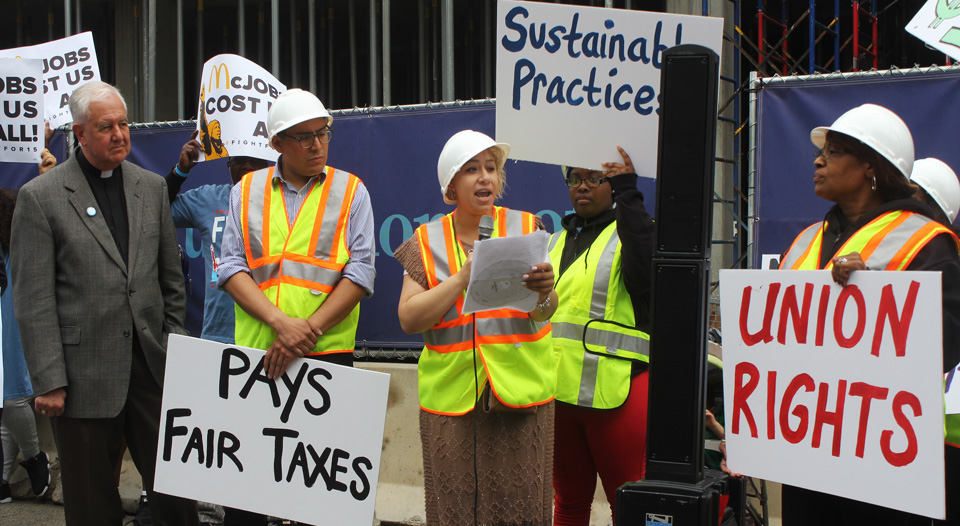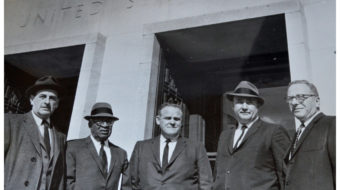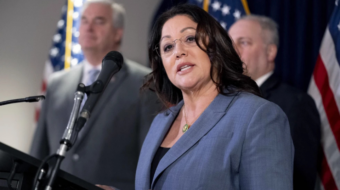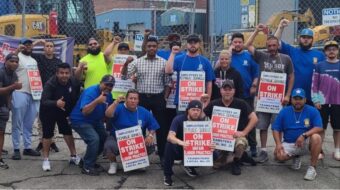
CHICAGO – A large crowd gathered May 23 outside the construction site in the West Loop where the new McDonald’s headquarters is set to be completed this upcoming year. The corporate giant has continuously thwarted employees in their demands for better working conditions and a livable wage. Organizations present at Tuesday’s action included: the Fight for $15, the Women’s March, MoveOn.org, Movement for Black Lives, Our Revolution, Next Gen, Color of Change, Fair Immigration Reform Movement, Repairers of the Breach, Indivisible Chicago, Women’s March-Chicago, Center for Community Change, 350.org, Patriotic Millionaires, Repairers of the Breach and Sierra Club. The allied groups voiced their support for the workers’ demands. The number of organizations throwing their support behind the workers continues to expand as the movement picks up momentum nationally.
Several of the speakers at the rally raised concerns over their livelihoods; a number of them noting that they have been unable to access adequate healthcare and necessary resources for their family. JT Langston, an organizer from the Fight for 15, spoke to People’s World about the mission of the movement: “we’re out here to demand a raise of the minimum wage, specifically for McDonald’s workers, but more for all fast food workers.” He cited the fact that McDonald’s was able to invest in the construction of a new headquarters, while continuously denying their workers an adequate living wage, as one reason for workers to voice their outrage.
Among other speakers at the rally, a number of community leaders and politicians took the microphone. “It is despicable,” said Alderman Carlos Rosas from the 35th Ward in regards to the working conditions set by the McDonald corporations, “whether you have a college degree, a GED a high-school degree or no degree, [workers] have dignity.” Ald. Rosas also made note of the fact that while the corporate giant may think it is saving money by denying workers a livable wage, it is actually contributing the rising burden of city costs. “McDonald’s relies on a billion dollars per year in welfare – every single time the McDonald’s corporation fails to pay a worker a living wage, every single time they fail to provide healthcare, fails to provide childcare, fails to provide to the people who are making their clients rich, who do they turn to? They turn to the taxpayer -they turn to you to pay the bill.” (story continues after video)
According to the Fight for $15’s press release, in March, McDonald’s executives announced the company has lost more than 500 million customers since 2012. That was the year cooks and cashiers at the fast-food giant first went on strike to demand $15 an hour and union rights. Workers have taken what many viewed as an outlandish proposition – $15 an hour– and made it the new labor standard in New York, California, Seattle and Washington, D.C. Home care workers in Massachusetts and Oregon won $15 an hour statewide minimum wages and companies including Facebook, Aetna, Amalgamated Bank, JP Morgan Chase and Nationwide Insurance have raised pay to $15 an hour or higher.
This protest comes on the heels of a long debate over the living wage, and while the conversation continues, Chicagoans are fully aware that even the 15 dollar an hour demand is the bare minimum for survival in 2017. The average rent for a for a one-bedroom apartment in the city comes out to about $1,341, and if you have a family, then a two-bedroom will cost around $1,744 on average. In the meantime, the residents of Chicago are left to foot the bill for the rising cost of living and McDonald’s, a $106.4 billion corporation, evades its responsibility to the employees that served as the foundation for its success.










